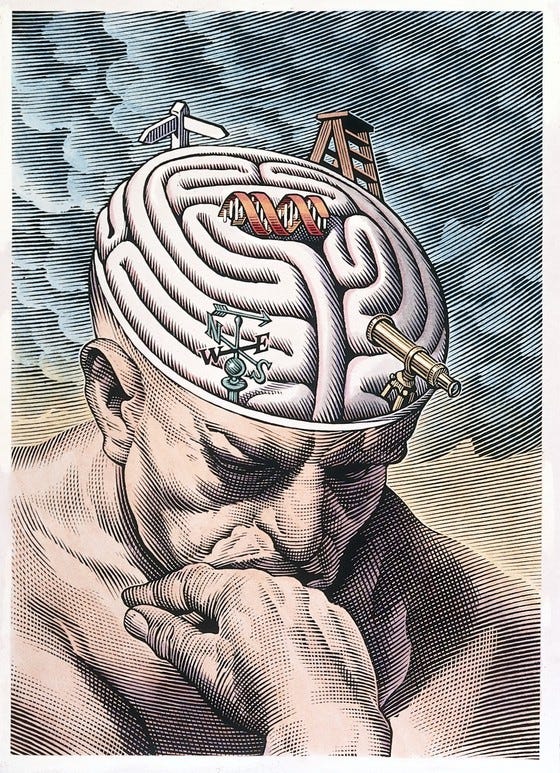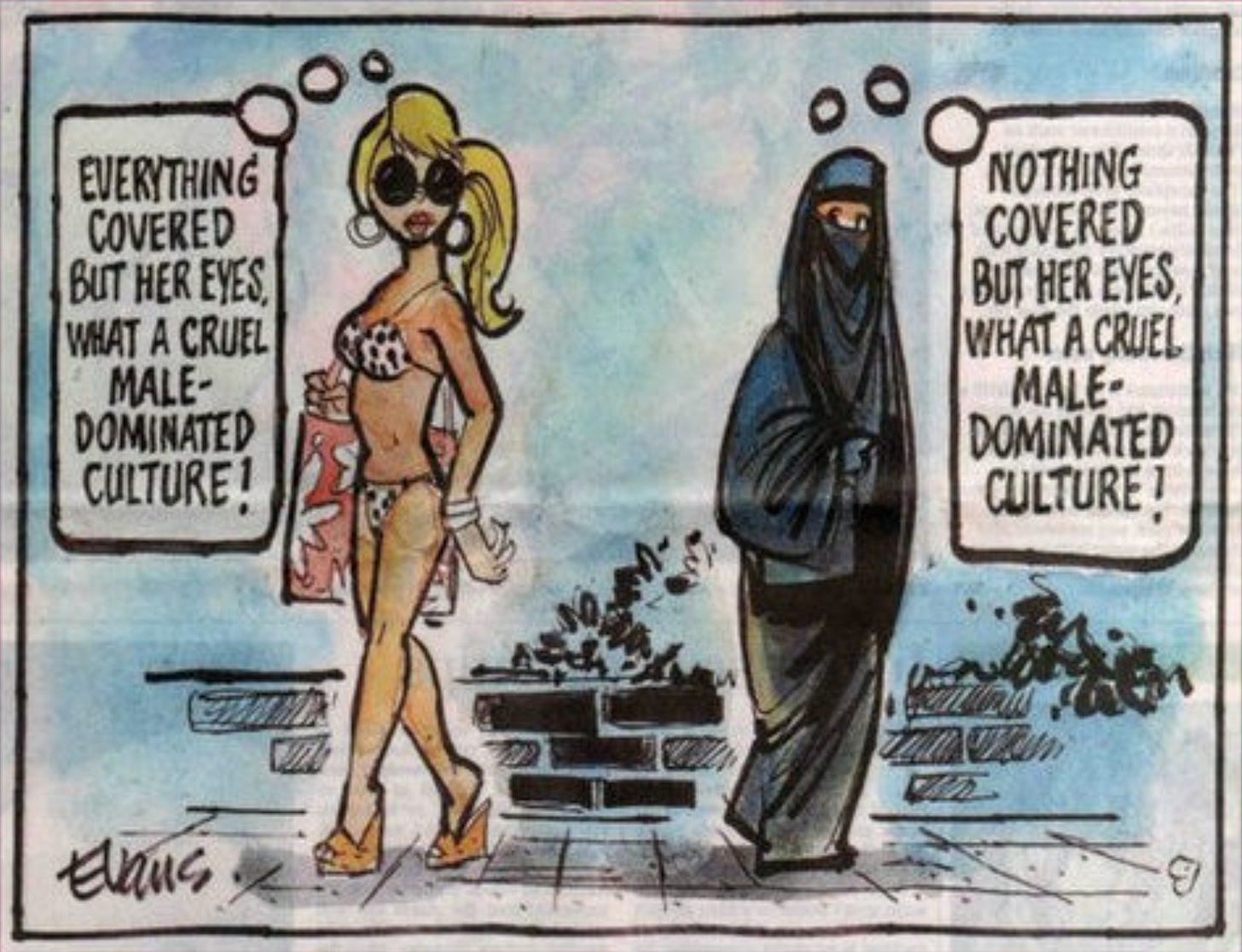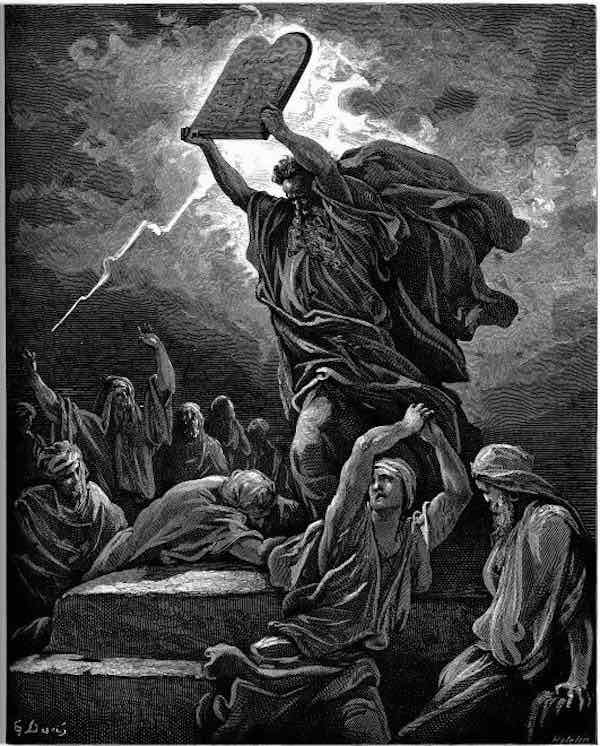How to Live an Epically Moral Life
The Paradox of Morality & Exploring a Dynamic Moral Framework That Works
Imagine that you hear gunshots in the background and see people running. Then you turn around and see a man killing another man.
Was this immoral?
The behavior itself isn't enough to make this judgment.
If the man who just got killed was an active shooter, then we interpret that same exact event very differently than if he was not.
So we don't judge events and behaviors in isolation; we look at the entire context, give it meaning, and asses it according to our values.
A genuine moral framework has to address both the subjective and the objective and be based on a grounded set of values and principles that don't change.
We need our Morality to act as a framework that helps us move forward in our lives, gives us something to live up to, and improves our lives and those around us.
So this Morality goes beyond good and evil; it's the Morality of the masters.
Let's go deeper!
Problems with Current Moral Frameworks
I have always had a problem with mortality. The idea that behavior could be objectively good or bad or neatly fit into categories of Good/Evil seemed too simplistic.
Additionally, if Morality is a real thing that exists, where does it come from?
If it comes from an external source, like your Country, Culture, or God, then aren't we at the mercy and whims of your Country, Culture, and God? When cultures and governments change, so does your Morality.
Alternatively, if Morality is purely subjective, many people will do as they please and rationalize their behavior by 'updating' their morals to fit the situation.
Lastly, Morality can't be a purely objective idea like 'Wellness' or 'Utilitarianism' because you don't know the full effects of your behavior. Everything we do has unintended consequences.
Consider the story of Thomas Midgley, an American chemist whose inventions have had a profound impact. He helped develop tetraethyllead (TEL), an anti-knock agent in Gasoline that made car engines efficient and reliable.
Later in his career, Midgley invented chlorofluorocarbons (CFCs), which were used in air conditioners, refrigeration systems, propellants in aerosol sprays, and blowing agents for foams and packing materials. CFCs were non-toxic and non-flammable and seemed ideal for many industrial applications.
Later, it was discovered that CFCs have a devastating effect on the Earth's ozone layer. When CFCs reach the upper atmosphere, they release chlorine atoms upon UV radiation exposure, depleting the ozone layer. His other invention, using TEL in Gasoline, contributed to lead contamination and significant health problems, particularly in children. Both Leaded Gasoline and CFCs have been phased out in most countries.
If we use an objective factor like 'well-being' or 'utility' as the main factor to judge Morality, then whether Midgley was moral depends on when the question is asked.
For Morality to be true and valid, it needs to be true across time, not subject to culture, religion, or the passing fancy of the individual.
It must be a rational set of truths that guide valuable behavior regardless of context or condition.
Such a morality must be dynamic, flexible, and usable like a tool.
Morality is the Truth to Live By.
Before I share my Dynamic Morality Model, it's essential to understand the Paradox of Morality and how specific Moral systems are breaking down.
The Paradox of Broken Moral Systems
Some may wonder what is wrong with Traditional Moral Systems, and isn't having a clear set of rules better than not having them at all?
The Traditionalists favor stability, and having a well-defined moral system is a part of that stability.
However, accepting this way of life comes with enormous cumbersome baggage that will ultimately weigh you down and prevent you from becoming a moral individual.
Here are a few of the main problems of following traditional moral rules.
Black-and-white Thinking: Classifying behavior into categories of good and Evil is too simplistic and doesn't account for the context or the bigger picture.
Goal-Oriented: Moral action is taken merely to achieve a particular outcome, i.e., ' being good,' instead of for the right reasons (which would require going beyond black-and-white thinking).
Morality through Comparison: The Self Righteous live in a World of comparative Morality:
Some are right, and others are wrong.
They judge their behavior one way by considering context and motivation.
They judge others differently depending on their group.
Judgments are a means of keeping challenging people and ideas at arm's length and using them to further justify and rationalize inner conflict.
Extreme judgment is used to keep self and others in line.
When failure occurs, it is minimized, excused, rationalized, justified, or self is punished, feeling guilty, unworthy, and so on, none of which address the core conflict.
Sinful World: Seeing a world of 'right' and 'wrong' often makes the self-righteous man 'right' and millions of other people 'wrong', which means there is a BIG problem in the world, and the self-righteous man needs to do something about it.
Ends Justify the Means: It becomes your duty to commit minor sins in order to address the world's Big Sins. This type of thinking fails to address the actual core issues and instead tries to circumvent them through 'small sins.'
Temptation: Without understanding why the temptation is there to begin with and working through that temptation, one is left with denial and suppression.
Suppression: forced actions on behavior level, suppressing specific thoughts/desires/temptations, trying to be a good little boy/girl, attempting to make one's self their own slave, listing to a set of rules
Sins of the Self Righteous: The trap of believing you're moral and that the ends justify the means, you give yourself room for minor sins and vices, which leads to becoming immoral.
The Paradox is that becoming 'Moral' by fitting the mold of a good, upstanding moral citizen can quickly lead one to take positions where the 'ends justify the means' and immoral actions are taken in the name of Morality.
The so-called mold of a moral man was nothing more than a mold. He was hollow and empty on the inside, only acting as prescribed, and such a man is capable of all kinds of evils, no less in the name of God.
Requirements for a Good Moral System
If Morality is to transcend different values, systems, beliefs, cultures, and philosophies, it has to be more than that.
It needs to be:
rational
valuable, practice, applicable
Be both subjectively and objectively valid
Take context, the individual, and society into account
be flexible, dynamic
it has to transcend the relative and conditional
transform vices, temptations, pathologies, suffering
to use it as a vehicle for your own self-actualization
Growth Self Care & Universal Care
Be an esteemable path that leads one and society to Universal Care
Be grounded in Truths of Live by
With this, we can address the core fundamental question: What is Morality?
Here, Morality is The Highest Truth we can Live by.
Now, let's jump into the system.
Morality: Dynamic Truth Compass
Morality is the highest Truth we can Live by.
This means that the most moral action is actualizing our Highest Potential and living in a way that moves us to the best version of ourselves.
It is living life in accordance with your Highest Truth.
To live according to this Truth, one needs to be Radically Honest with oneself.
Radical Self-Honesty is the bedrock, the heart of Morality.
Now let's look at the rest of the system:
Part 1: Ideal Self & Highest Potential
Here, the individual contemplates on their ideals and highest purpose. They create a plan and start moving towards becoming the best version of themselves by incorporating their ideals and highest purpose.
The highest purpose is inclusive and extends beyond themselves. It ultimately serves the greater good. It is a win-win-win configuration where actions benefit the individual, the people they do business with, and the broader community.
In the beginning, the focus can be on the self. Then, as the self grows, it becomes more and more inclusive in its circle of care. The circle of care can then start extending friends, family, and other close relationships and, after some time, include their broader community, country, all people, all living beings, life on Earth, and finally, all consciousness.
When any individual reaches their highest potential, it becomes a living example of what is possible and how we can all live our lives in an ethic that is deeply meaningful, utterly profound, and ultimately blissful.
Part 2: Radical Self Honesty
Ideas have a way of showing us where we are, and often, in our modern world, they are shunned for making us feel unworthy. An immature response to feeling unworthy is to get rid of the ideal or to shit it. It's like the Fox who couldn't reach the grapes that goes on to say, 'The grapes are sour, and I didn't want them anyway.'
Such an attitude leaves us nowhere. The only way forward is radical honesty.
In fact, any tangible personal growth and transformation starts with radical honesty.
In many meditative traditions, it is often said that this path is only for those who have had so much suffering that they have simply had enough, and the only thing left is for them to look at the Truth.
In a conventional sense, the Truth is very dangerous because it will obliterate your beliefs and false gods.
It won't just shake your foundation.
It will dissolve it.
And for the first time in your life, you will be walking alone, on quicksand, with nothing to hold onto.
And now you have to learn how to surf the fluidity that is life.
Part 3: Acting in the World
For the moral man, action is directly tied to his highest purpose. His highest purpose and living up to his ideals ensure that there is no discrepancy between the means and the ends. Here, the means and the ends are the same thing, so the means don't ever justify the ends.
There is a deep honesty and sincerity in action. He acts out his most profound Truth and highest purpose.
However, becoming the best version of yourself isn't like flipping a switch.
It is a process. A process of confronting challenging situations, contradictions, and personal weaknesses.
Here, the Moral Man must confront himself in the deepest of ways to gain clarity on how to behave, and this confrontation takes place in the real world.
He has to walk out of Hell to get into Heaven.
And Hell isn't just a place out there; it's a place that is also in here.
Part 4: Transformation Through Your Vices & Inner Demons
Growth and the path forward is not linear.
He does his best, yet when he makes mistakes or takes actions that break his own moral code (e.g., being dishonest), he seeks to understand the reasons for his actions, motivations, where they come from, and what needs they serve.
Moral growth involves examining one's flaws, mistakes, and darker aspects of one's character.
The moral man unwinds and addresses his weaknesses and vices at a core level, transcending them in this way.
This process does not avoid or condemn immoral actions but seeks to understand and transform them into sources of growth and insight.
Paradoxically, what may appear as moral failings is an essential step in an individual's ethical development.
Part 5: Alchemy & Sublimation: Paradoxical Nature of Moral Growth
Here, Morality and Personal Growth are very Hegelian.
Our dark side, our weaknesses, fears, shame, and the parts of ourselves that we prefer to pretend that they don't exist are the fuel for our growth.
They torture us, lead us astray and into suffering. They show us that living a superficial life and going through the motions isn't enough. The part that yearns, the longs for fulfillment, remains empty.
The Devil's Gift and the Grace of Suffering show us what we need to work on.
Suffering and pain are the only things that we can't lie to ourselves about. The only way to get past them is to go through them.
By working through our Shadow, we can begin to see the light. Like a tortured artist who turns his inner dread into a masterpiece. Like a singer that sings to their heart's content.
In this way, even Evil is helpful and can be used as energy for one's transformation.
These acts of sublimation are the alchemy that transforms Evil into good.
Part 6: Becoming the Hero: Self-Care to Universal Care
As individuals go through this process, they become heroic. They live up to their potential by being the best version of themselves, and they transform life around them.
Here, the Moral Man knows that this is not about them because life is not about him.
Life is about all of us, and like any hero, the honest and moral man ultimately has a universal sense of care.
They care for all beings and consciousness itself.
Part 7: Being & Becoming
The Moral Man does not have a goal more significant than their highest purpose. And the journey to their highest purpose is the way. Here, the ends and the means are one. They are part of one continuous process of being and becoming.
This is a radical shift away from goal-oriented behavior. There is no difference between the ends and the means.
There is no shortcut to take or lie to tell that will help the Honest Man achieve their highest purpose. An Honest Man can’t lie his way to becoming a more honest man.
What he aims to become and how he is in each moment are the same thing.
The Paradox of the Moral Man
The truly Moral Man is a paradox, and their very way of being is remarkably Hegelian.
They behave according to their own code, which is in alignment with their highest purpose and reason for being. This process is a form of radical self-honesty in action.
Yet a person like this might lie, cheat, steal, and even kill!
They might even be a Nazi weapons manufacturer and profit by exploiting Jews in labor in camps.
And this was the story of Oskar.
The appearance was that Oskar was a war profiteer and a member of a morally reprehensible Nazi regime that put Jews in camps and made weapons for Germany in WW2.
In reality, Oskar Schindler was a hero who risked his own life and spent his entire fortune to save the lives of more than 1,200 Jews during the Holocaust by employing them in his factories and protecting them from deportation and death in the concentration camps.
And like most Moral Men, he wasn't always this way.
Initially, Schindler was a Nazi businessman who saw an opportunity to profit.
As he evolved, he began to realize a higher purpose beyond himself. He began to live up to a set of ideals that led him to become the protector of the Jews.
This transformation required a deep level of self-reflection, radical honesty, and an imperative to confront the social and political situation of his time.
Schindler embodies the principle of acting in accordance with his highest truths and purpose, which ironically also meant that he had to constantly lie, cheat and steal from the Nazis.
His story exemplifies the paradoxical nature of Morality, which is a fluid, dynamic process of thesis, antithesis, and synthesis.
It is a dialectic process, an alchemy that sublimates greed, indifference, complicity, and hatred into compassion and care.
Schindler didn't win or make a difference by fighting Evil or trying to destroy the Nazis, but instead by transforming the situation itself.
Ultimately, Schindler shows us how becoming a Moral Man and living up to newly found ideals is possible, even in the most extreme circumstances. When things get tough, he shows us that even in the worst situation, we can create a slice of heaven in hell.
From Ideas to Action
For those of you interested applying these ideas, I created a Hero’s Journey Workbook that subscribers can download for Free.
You can see a free Preview here. This PDF is typically $20












